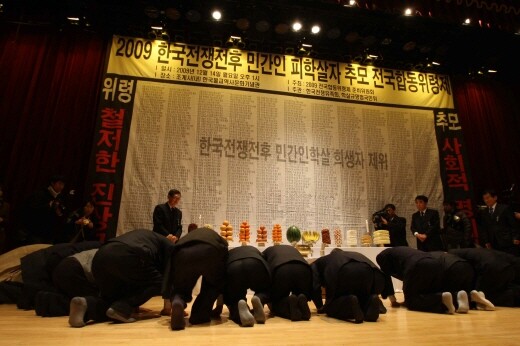hankyoreh
Links to other country sites 다른 나라 사이트 링크
Famillies commemorate 8,000 civilian victims the Korean War at Jogye Temple

Eight thousand names are listed on a banner that was hung behind a memorial table set up in the Jogye Temple located in Seoul’s Jongno District on Dec. 18 to commemorate the civilian victims who had been killed during the Korean War. The names listed in this 10th joint memorial service include victims from across the country, including the city of Yeosu in South Jeolla Province, the county of Yeongdeok in North Gyeongsang Province and the city of Kimpo in Gyeonggi Province. While the causes for their death range from bombing by U.S. planes to death at the hands of South Korean soldiers, North Korean soldiers and partisans, all 8 thousand were civilians and not combat soldiers.
Approximately 6 hundred elders gathered at the hall for the memorial service. Seo Ki-tae, a 72-year-old man who took photos with his mobile phone, lost his elder brother in 1948 when South Korean soldiers killed civilians in what is now referred to as the Yosu Rebellion. Although Seo has been able to claim his brothers’ remains due to an investigation by South Korea’s Truth and Reconciliation Commission, he has not yet been able to give his brother a proper burial since the government has not prepared a place for the remains of such victims from the Korean War. He said, “I was hoping that the government would participate in this service and issue an apology for the death of all of these innocent people.”
In addition to Seo, some bereaved family members whose relatives were killed by North Korean soldiers and partisans were also in attendance. A man with the surname of Kim, 49-years-old, lost his mother and two younger brothers at the hands of partisans as a result of his father’s service as a South Korean soldier. Kim said, “Some have referred to the victims as leftists or rightists, however, I believe all of the civilians that were killed by soldiers were victims of massacre.” He also expressed his regret that the government has failed to issue an apology.
The bereaved family members attempted to march to Gwanghwamun Square following the memorial service, but found themselves blocked by police. Thus, a representative of the bereaved family members held a press conference later that day at the Korea Press Center located in Seoul’s Taepyungro neighborhood demanding a government apology and compensation to the victims’ families.
Please direct questions or comments to [englishhani@hani.co.kr]
Editorial・opinion
![[Column] Park Geun-hye déjà vu in Yoon Suk-yeol [Column] Park Geun-hye déjà vu in Yoon Suk-yeol](https://flexible.img.hani.co.kr/flexible/normal/500/300/imgdb/original/2024/0424/651713945113788.jpg) [Column] Park Geun-hye déjà vu in Yoon Suk-yeol
[Column] Park Geun-hye déjà vu in Yoon Suk-yeol![[Editorial] New weight of N. Korea’s nuclear threats makes dialogue all the more urgent [Editorial] New weight of N. Korea’s nuclear threats makes dialogue all the more urgent](https://flexible.img.hani.co.kr/flexible/normal/500/300/imgdb/original/2024/0424/7317139454662664.jpg) [Editorial] New weight of N. Korea’s nuclear threats makes dialogue all the more urgent
[Editorial] New weight of N. Korea’s nuclear threats makes dialogue all the more urgent- [Guest essay] The real reason Korea’s new right wants to dub Rhee a founding father
- [Column] ‘Choson’: Is it time we start referring to N. Korea in its own terms?
- [Editorial] Japan’s rewriting of history with Korea has gone too far
- [Column] The president’s questionable capacity for dialogue
- [Column] Are chaebol firms just pizza pies for families to divvy up as they please?
- [Column] Has Korea, too, crossed the Rubicon on China?
- [Correspondent’s column] In Japan’s alliance with US, echoes of its past alliances with UK
- [Editorial] Does Yoon think the Korean public is wrong?
Most viewed articles
- 1‘We must say no’: Seoul defense chief on Korean, USFK involvement in hypothetical Taiwan crisis
- 2N. Korean delegation’s trip to Iran shows how Pyongyang is leveraging ties with Moscow
- 3‘Weddingflation’ breaks the bank for Korean couples-to-be
- 4Korea sees more deaths than births for 52nd consecutive month in February
- 546% of cases of violence against women in Korea perpetrated by intimate partner, study finds
- 6Will NewJeans end up collateral damage in internal feud at K-pop juggernaut Hybe?
- 7[Column] Park Geun-hye déjà vu in Yoon Suk-yeol
- 8[Editorial] New weight of N. Korea’s nuclear threats makes dialogue all the more urgent
- 9Amnesty notes ‘erosion’ of freedom of expression in Korea in annual human rights report
- 10“Parental care contracts” increasingly common in South Korea